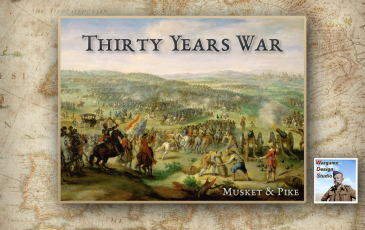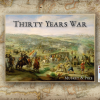051_Nordlingen - Salvo Variant - WDS Thirty Years War

64f8a9520a0c004fd5ef.jpg) 0 - 0 - 0
0 - 0 - 0
435be480296def0cb8f9.jpg)
| Rating: | 0 (0) |
| Games Played: | 0 |
| SM: | 2 |
| Turns: | 24 |
| Type: | Stock |
| First Side: | Anti-Imperialist (TYW) |
| Second Side: | Imperialist (TYW) |
Date: 6th September 1634 - Size: Medium - Location: Nordlingen, Bavaria
Scenario Briefing: First Battle of Nordlingen - Bernhard, with an army of over 10,000 men, faced by a 25,000 strong Imperialist force, was compelled to abandon Regensburg to its fate and seek the assistance of his Swedish ally, Horn, despite their conflicting strategic aims and mutual hatred. This personal rivalry would have a significant impact on the Anti-Imperialist cause, both at the strategic level and on the battlefield. After failing to relieve Regensburg and Donauwerth, the Anti-Imperialist leaders were determined to save Nordlingen. Prior to the battle, Horn had attempted to persuade Bernhard to wait a few more days for reinforcements to arrive before attacking the more numerous enemy. However, Bernhard felt that Nordlingen would be unable to hold out that long. An attempt to take the enemy by surprise was foiled by Croats and dragoons, who were able to slow down the Anti-Imperialist advance until it was too late in the day to fight a battle. In the confusion of a night march, Horn's troops were still moving into position facing the key Allbuch hill after midnight.
Meanwhile, the Imperialist general Gallas had realized the importance of the Allbuch and also the Schonfeld hills and had sent troops and guns to dig in and fortify the positions. By dawn, three "trefoil" earthworks had been constructed in preparation for the anticipated Anti-Imperialist assault. Horn obligingly attacked with most of the Anti-Imperialist foot, but without the support of most of the available guns. Bernhard's role would be to protect Horn's flank. After some initial success against inexperienced defenders, Horn's troops were thrown back. All further attempts to secure the hill proved futile and only resulted in heavy losses. By 7.30am, Horn realized that he needed Bernhard's troops to assist. However, reinforcing a failed attack rather than employing Bernhard's cavalry to assist the army to disengage and retreat, proved utterly disastrous for the Anti-Imperialists.
Following the decisive Anti-Imperialist defeat which eliminated Swedish power in Germany, other German towns quickly submitted to the Emperor. Georg of Brunswick and Johann Georg of Saxony, Moderate Anti-Imperialist leaders, stopped fighting or switched sides after the Peace of Prague was signed in May 1635. The conflict might have concluded at this point - it certainly ceased to be a religious war focused on Germany - but the French decision to declare war on Spain on 21 May 1635 expanded the scope of the war and effectively renewed the old Franco-Spanish rivalry of the previous century.
Recommended Rules: Default
Note: Probably best played as the Anti-Imperialist side against the A/I or else Head-to-Head.
Note: This scenario uses the Salvo pdt, with increased fire factors for Salvo muskets but no defensive fire capability. In addition, battalion guns are represented abstractly with enhanced range and firepower for the associated infantry units.
Scenario Briefing: First Battle of Nordlingen - Bernhard, with an army of over 10,000 men, faced by a 25,000 strong Imperialist force, was compelled to abandon Regensburg to its fate and seek the assistance of his Swedish ally, Horn, despite their conflicting strategic aims and mutual hatred. This personal rivalry would have a significant impact on the Anti-Imperialist cause, both at the strategic level and on the battlefield. After failing to relieve Regensburg and Donauwerth, the Anti-Imperialist leaders were determined to save Nordlingen. Prior to the battle, Horn had attempted to persuade Bernhard to wait a few more days for reinforcements to arrive before attacking the more numerous enemy. However, Bernhard felt that Nordlingen would be unable to hold out that long. An attempt to take the enemy by surprise was foiled by Croats and dragoons, who were able to slow down the Anti-Imperialist advance until it was too late in the day to fight a battle. In the confusion of a night march, Horn's troops were still moving into position facing the key Allbuch hill after midnight.
Meanwhile, the Imperialist general Gallas had realized the importance of the Allbuch and also the Schonfeld hills and had sent troops and guns to dig in and fortify the positions. By dawn, three "trefoil" earthworks had been constructed in preparation for the anticipated Anti-Imperialist assault. Horn obligingly attacked with most of the Anti-Imperialist foot, but without the support of most of the available guns. Bernhard's role would be to protect Horn's flank. After some initial success against inexperienced defenders, Horn's troops were thrown back. All further attempts to secure the hill proved futile and only resulted in heavy losses. By 7.30am, Horn realized that he needed Bernhard's troops to assist. However, reinforcing a failed attack rather than employing Bernhard's cavalry to assist the army to disengage and retreat, proved utterly disastrous for the Anti-Imperialists.
Following the decisive Anti-Imperialist defeat which eliminated Swedish power in Germany, other German towns quickly submitted to the Emperor. Georg of Brunswick and Johann Georg of Saxony, Moderate Anti-Imperialist leaders, stopped fighting or switched sides after the Peace of Prague was signed in May 1635. The conflict might have concluded at this point - it certainly ceased to be a religious war focused on Germany - but the French decision to declare war on Spain on 21 May 1635 expanded the scope of the war and effectively renewed the old Franco-Spanish rivalry of the previous century.
Recommended Rules: Default
Note: Probably best played as the Anti-Imperialist side against the A/I or else Head-to-Head.
Note: This scenario uses the Salvo pdt, with increased fire factors for Salvo muskets but no defensive fire capability. In addition, battalion guns are represented abstractly with enhanced range and firepower for the associated infantry units.





















